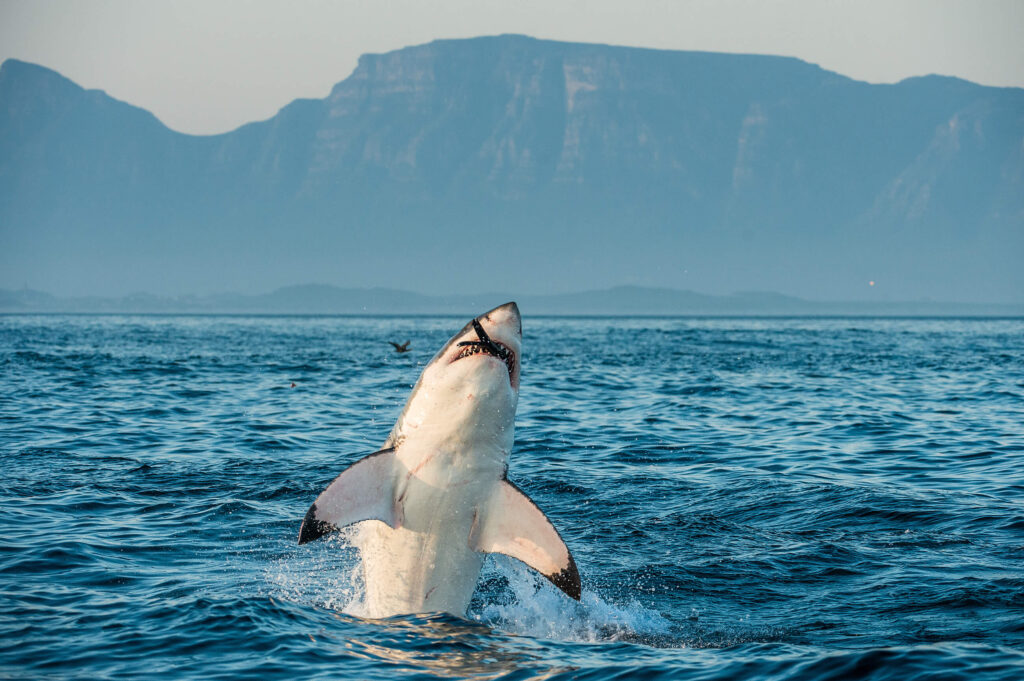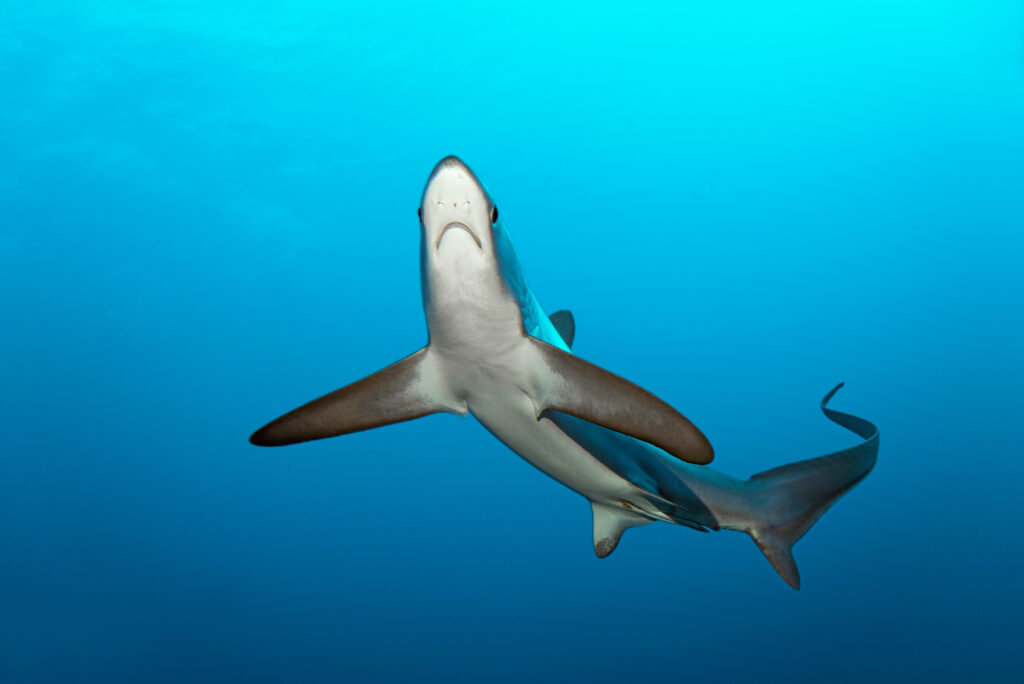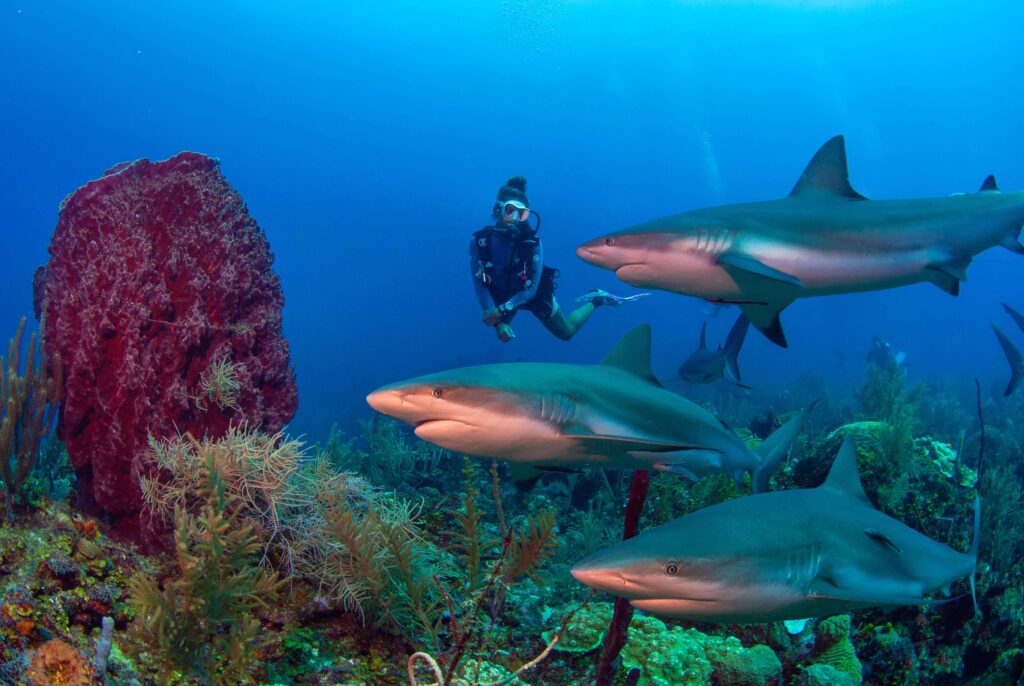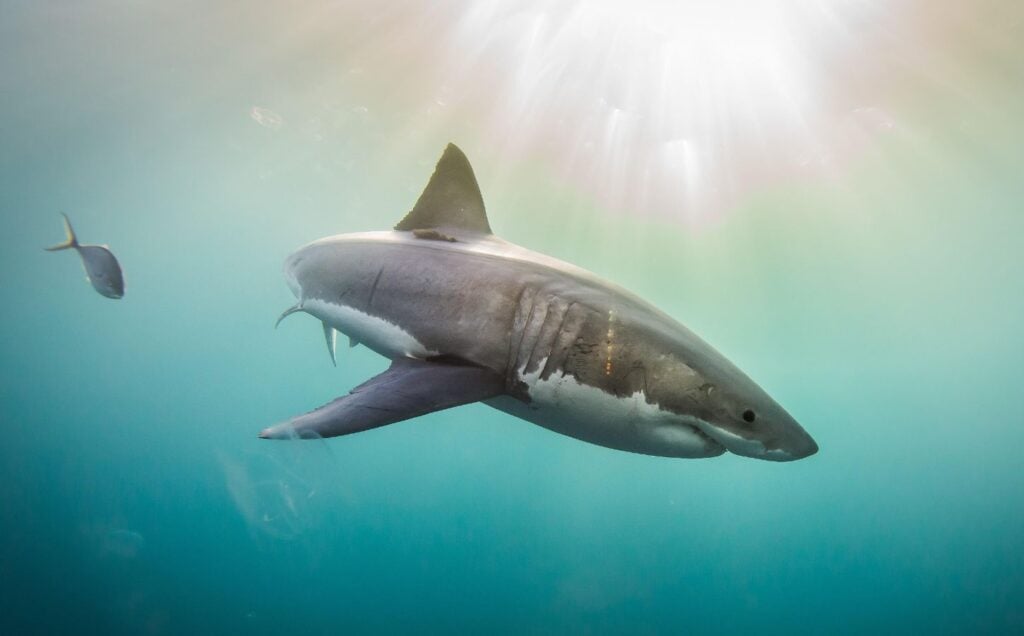When you hear “shark,” many people think “attack.” Or dangerous, or aggressive, or Jaws. The reputation of sharks precede them, with a majority of people being scared of the species. But for the animals (who are technically fish), public opinion matters. In their case, it is literally life or death.
While this concept is sobering enough on its own, the public’s perception of sharks is largely off the mark. Research into the species indicates they’re complex individuals who are capable of a range of emotions. They can plan ahead, have likes and dislikes, and maintain friendships. Plus, their very existence helps biodiversity flourish.
According to Andrea Richey, the executive director of the Hong Kong Shark Foundation, it’s this misunderstanding of the species that is fueling the “global shark crisis.”
Jump to section:
- Threats faced by sharks
- Extreme population decline
- How often do sharks attack?
- Personalities and social lives
- Biodiversity
- How to save the sharks
Greatest threats to sharks
Sharks have been around for at least 420 million years (200 million more than dinosaurs), meaning they’ve lived through four out of five of Earth’s “mass extinctions.”
But sharks’ current leading threat? Us.
“Right now we are experiencing a global shark crisis,” Richey, who is a former lawyer, told Plant Based News (PBN) in an interview. “Over 100 million sharks are killed annually.”
It’s not a new issue; humans have been hunting and killing sharks for their flesh and fins for centuries. But there has been a sharp uptick in their deaths in recent decades, due to an 18-fold increase in relative fishing pressure, according to a study published in Nature in 2021.

Between 1970 and 2018, oceanic shark and ray populations nosedived by 71 percent, the study found (and that figure may even be an underestimation). This has left many sharks threatened or critically endangered. Richey warns that more than one-third of shark species – there are more than 500 known species – are nearing extinction.
Professor Nick Dulvy, co-author of the 2021 Nature study, named the findings “staggering” and “stark.”
“If we don’t do anything, it will be too late,” Dulvy said in a statement when the research was published. “It’s much worse than other animal populations we’ve been looking at. It’s an incredible rate of decline steeper than most elephant and rhino declines, and those animals are iconic in driving conservation efforts on land.”
Nathan Pacoureau, who led the research, said he hopes the study “serves as an urgent wake-up call.”
Why are so many sharks dying?
Overfishing, habitat destruction, and the climate crisis are pushing shark numbers down, Richey says, as well as the shark trade, which sees their body parts used in food, medicine, and clothing.
“Intensive commercial and recreational fishing results in unsustainable practices such as bottom trawling, by-catch, and inhumane mutilation via finning or ‘livering,’ where sharks are gutted and thrown into the sea in order to preserve the state of their livers quickly,” Richey tells PBN. (Shark liver oil is used in some medicines and supplements.)
“All these phenomena contribute to the rapid reduction of not only sharks, but their prey and their habitats,” she adds.

Their slow reproductive cycles only exacerbates the problem, since many don’t survive long enough to have offspring. “Sharks are known for being very slow in their reproductive capacity, especially due to the vigorous nature of courting and copulation for sharks,” Richey explains. Shark pregnancies are typically around 12 months, but some species, like the frilled shark, can be pregnant for more than three years. When sharks do give birth – either by laying eggs or giving birth to live young – they often only have a few pups at a time, and leave several years between pregnancies.
Some sharks don’t reach reproductive age until around 15 years. But that’s little compared to the Greenland shark, who only start having pups at 150 years old, Richey says (a fact that is among her favorites). Incredibly, the species can live up to 400 years when left untouched. “Sadly many Greenland sharks are killed before they’ve had a chance to reproduce,” Richey said.
‘Attack’ myths: leaving sharks high and dry
Some policies have been put in place to protect sharks, but the fish are largely left to fend for themselves. Many experts say the public’s perception of sharks is, at least partially, to blame.
Around a decade ago, researchers asked 1,000 American adults about their feelings towards sharks. More than half of them admitted they were “terrified” of the animals, while around 38 percent said sharks made them scared to swim in the ocean. Another survey from 2015 discovered that 39 percent of UK adults hated sharks.
But shark attacks are exceedingly rare. According to the International Wildlife Museum, humans have a one in 3.75 million chance of being killed by a shark. You’re more likely to die from fireworks, lightning, a toaster, or being hit by a flying champagne cork. And while shark “attacks” lead to the deaths of less than 10 people a year worldwide, humans kill more than 11,000 sharks every hour.
Media representation has played a key role in muddying the reputation of sharks. An analysis of how sharks are portrayed in films found that 96 percent of movies overtly show shark-human interactions as dangerous for humans. Much of this began with Jaws.
The impact of ‘Jaws’
“Jaws was kind of a turning point,” Chris Lowe, director of the Shark Lab at California State University told the Washington Post in 2022. “It got people thinking very negatively about sharks, which just made it so much easier to overfish them.”

George Burgess, director of the Florida Program for Shark Research, said a “collective testosterone rush” followed the release of the film. “Thousands of fishers set out to catch trophy sharks after seeing Jaws,” he said to the BBC in 2015. He added that “there was no remorse, since there was this mindset that they were man-killers.”
Years after his book’s release, Jaws author Benchley reiterated that “sharks don’t target human beings, and they certainly don’t hold grudges” like his 1974 novel suggests.
“Knowing what I know now, I could never write that book today,” Benchley, who later became a marine conservationist and advocate for sharks before passing away in 2006, has been quoted as saying. “The sea is worthy more of respect and protection than fear and exploitation.” Steven Spielberg, who directed the famous 1975 Jaws film, similarly said he “truly regrets” the impact his film had on shark populations.
What are sharks really like?
This misinformation is what the Hong Kong Shark Foundation is working to unravel. “Hollywood has created a lucrative ‘fear’ industry by wrongfully exploiting the image of sharks,” Richey tells PBN. But sharks, like humans and many other animals, have unique individual personalities. Researchers have found that some sharks are braver than others, and cope with stress differently to one another.
Other research indicates sharks have strong social connections and that these vary from individual to individual. Some, for example, tend to spend time alone or with a small pool of acquaintances. Others keep larger social groups, remaining in touch over extended periods of time and despite moving between habitats. Many hunt in groups or pairs.
Along a similar vein, a 2021 study from Fiji found that bull sharks – often considered the most dangerous to humans – develop companionships of their own. Researchers looked at data that spanned 13 years from more than 3,000 shark dives. They discovered that bull sharks displayed preferences for certain shark individuals – and actively avoided others. Separate research found that grey reef sharks met up with the same “friends” in the same location year after year.
“Sharks are fascinating creatures,” Richey says. “Every species of shark has their own unique mannerisms and behaviors, so sharks really cannot be put into one collective ‘box’. In fact, some sharks are so unique they have been known to be friendly and even remember certain divers!”
Indeed, shark conservationist and diver Jim Abernethy’s experience testifies to that. He’s maintained a “friendship” with a wild 15-foot tiger shark for two decades. The shark, named Emma, even remembered him after having been separated for a year.
Balancing the seas
Sharks are vital to our ecosystem and without them, our planet wouldn’t be the same. “Sharks play an important role in our ocean and are essential to maintaining a balanced environment for all marine life to thrive,” Richey explains.
“If sharks are not around to maintain balance, other predators who may feed on smaller organisms or marine plant life will increase disproportionately,” she says, “and result in the rapid destruction of areas prone to damage, such as reef branches.”
“There is evidence of this phenomenon already occurring,” Richey notes. This “shifting dominance of organisms” can be seen in the overgrowth of algae in coral reefs, for example, due to a lack of herbivorous or omnivorous predators such as the basking and whale sharks. Sharks’ predatory behavior also encourages prey to switch up their habitats frequently.
“They are really opportunists who cull the weak and sick fish or sea mammals who are less fit for survival,” Richey explains. “These ‘cleaners of the sea’ help maintain biodiversity and keep oceans clean.”
Electro-sensory system
How they do this stems from a highly refined sensory ability that is unique to sharks: their ampullae of Lorenzini.
“The ampullae of Lorenzini, located around their head and snout, are what make up the ‘electro-sensory system’ of sharks, which is how they can detect the heartbeats of prey using electromagnetism,” Richey tells us.
“This is an important factor in understanding the behavior of sharks because they are likely to only target prey who seem more vulnerable due to illness or fatigue by sensing the strength of their heartbeats.”
How to help sharks
Try plant-based seafood

Perhaps the most impactful thing we can do to protect sharks is keep them and other fish off our plates.
Shark fin soup is still eaten in many parts of the world, especially Asia, while meat from endangered sharks has appeared in fish and chip shops in the UK and Australia (without shoppers knowing).
All kinds of “seafood” puts sharks at risk. Aside from the pollution and biodiversity changes caused by commercial fishing, sharks are frequently killed as bycatch. Bycatch refers to marine life that is unintentionally captured while fishing for another species or target animal. It’s estimated that 10 to 40 percent of the world’s global “catch” is bycatch, leaving countless sharks, whales, dolphins, turtles, seals, and others accidentally injured or killed.
Additionally, sharks and other animals often become entangled in discarded fishing gear, which makes up a majority of plastic trash in the water.
Make mindful purchases
Shark byproducts can turn up in surprising places. Squalene, for example, can be derived from sharks and is commonly used in supplements as well as sunscreen, lipstick, lip balm, foundation, and eyeshadow.
Similarly, shark skin can be used to make leather bags, belts, shoes, and more. Choosing to buy vegan-friendly cosmetics, clothing, accessories, and other products helps keep sharks in the ocean where they belong. Richey summarizes the point well: “Simply put, when we stop the buying, we stop the killing!”
Talk about it
Humankind’s perception of sharks can be a powerful factor in their welfare, so debunking the myths surrounding them is vital. “We believe educating consumers is the key to successful shark conservation,” Richey says about Hong Kong Shark Foundation, which has its own Shark Ambassador education program. “Informing those around you about the nature of these products will help aid conservation efforts immensely.”
“I like to think it is their ocean and we are just sharing it with them,” Richey says. And with enough compassion, care, and action, humankind and future generations will be able to see and “appreciate just how majestic and important to our planet sharks really are.”
For more information about the Hong Kong Shark Foundation, including how to donate, visit the website here






